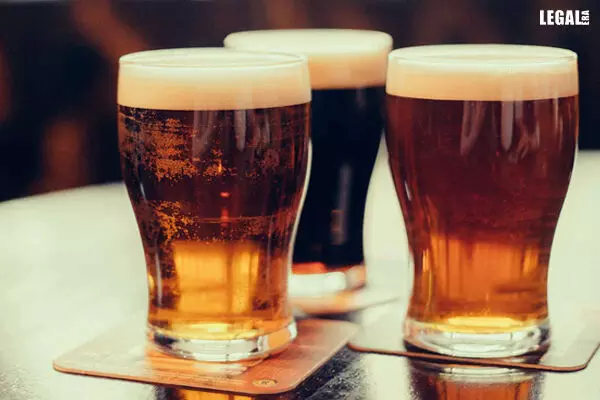- Home
- News
- Articles+
- Aerospace
- Agriculture
- Alternate Dispute Resolution
- Banking and Finance
- Bankruptcy
- Book Review
- Bribery & Corruption
- Commercial Litigation
- Competition Law
- Conference Reports
- Consumer Products
- Contract
- Corporate Governance
- Corporate Law
- Covid-19
- Cryptocurrency
- Cybersecurity
- Data Protection
- Defence
- Digital Economy
- E-commerce
- Employment Law
- Energy and Natural Resources
- Entertainment and Sports Law
- Environmental Law
- FDI
- Food and Beverage
- Health Care
- IBC Diaries
- Insurance Law
- Intellectual Property
- International Law
- Know the Law
- Labour Laws
- Litigation
- Litigation Funding
- Manufacturing
- Mergers & Acquisitions
- NFTs
- Privacy
- Private Equity
- Project Finance
- Real Estate
- Risk and Compliance
- Technology Media and Telecom
- Tributes
- Zoom In
- Take On Board
- In Focus
- Law & Policy and Regulation
- IP & Tech Era
- Viewpoint
- Arbitration & Mediation
- Tax
- Student Corner
- AI
- ESG
- Gaming
- Inclusion & Diversity
- Law Firms
- In-House
- Rankings
- E-Magazine
- Legal Era TV
- Events
- News
- Articles
- Aerospace
- Agriculture
- Alternate Dispute Resolution
- Banking and Finance
- Bankruptcy
- Book Review
- Bribery & Corruption
- Commercial Litigation
- Competition Law
- Conference Reports
- Consumer Products
- Contract
- Corporate Governance
- Corporate Law
- Covid-19
- Cryptocurrency
- Cybersecurity
- Data Protection
- Defence
- Digital Economy
- E-commerce
- Employment Law
- Energy and Natural Resources
- Entertainment and Sports Law
- Environmental Law
- FDI
- Food and Beverage
- Health Care
- IBC Diaries
- Insurance Law
- Intellectual Property
- International Law
- Know the Law
- Labour Laws
- Litigation
- Litigation Funding
- Manufacturing
- Mergers & Acquisitions
- NFTs
- Privacy
- Private Equity
- Project Finance
- Real Estate
- Risk and Compliance
- Technology Media and Telecom
- Tributes
- Zoom In
- Take On Board
- In Focus
- Law & Policy and Regulation
- IP & Tech Era
- Viewpoint
- Arbitration & Mediation
- Tax
- Student Corner
- AI
- ESG
- Gaming
- Inclusion & Diversity
- Law Firms
- In-House
- Rankings
- E-Magazine
- Legal Era TV
- Events
Karnataka High Court Rejects 'Smell of Alcohol' as Reason to Deny Compensation to Accident Victim

Karnataka High Court Rejects 'Smell of Alcohol' as Reason to Deny Compensation to Accident Victim
The Karnataka High Court has declared that an offending driver cannot use the excuse of the claimant being intoxicated or smelling of alcohol to justify causing a road traffic accident and inflicting injuries on the victim.
Justice Dr. HB Prabhakara Sastry, sitting as a single judge on the bench, affirmed that the claimant's status as a victim cannot be disregarded, and relief cannot be denied because he was intoxicated or smelled of alcohol.
The court stated that even if it were true that the claimant, who is alleging to be the victim in the road traffic accident under consideration, was intoxicated or had an odour of alcohol, this would not justify the offending bus driver for causing the accident and inflicting injuries on the claimant.
Based on this perspective, the court granted the claimant's appeal against the Tribunal's order, which had dismissed the claim petition, and sent the matter back for further consideration of issues related to compensation, entitlement, quantum, and so on.
The Tribunal had rejected the claim on the basis that the claimant was intoxicated with alcohol and had left the footpath, standing near the edge of the road at the time of the accident.
Therefore, the Tribunal had concluded that the bus driver was not negligent in the given circumstances.
The appellant-claimant's counsel contended that the mere presence of alcohol odour cannot be used to conclude that the accident occurred solely due to the claimant's negligence. The counsel further argued that the occurrence of the road traffic accident is not disputed, and the police investigation records indicate that the bus driver was charged under Sections 279 and 338 of the Indian Penal Code, 1860 for the offense.
The counsel further argued that since the driver had already pleaded guilty for the offenses punishable under Sections 279 and 338 of the IPC and was penalised accordingly, and evidence was presented by PW-1 to establish the driver's rash and negligent driving, the Tribunal erred in answering the issue negatively.
In contrast, the counsel for the respondent-insurer contended that since the claimant was under the influence of alcohol at the time of the accident and even stated that he was hit by the rear wheel of the bus, no negligence can be attributed to the driver of the bus. Therefore, the Tribunal was correct in its finding that the claimant had failed to prove negligence on the part of the driver of the alleged offending bus.
Initially, the court observed that the Wound Certificate only mentioned the smell of alcohol, and it did not indicate whether the claimant, who was a patient at the time of examination, was intoxicated with alcohol or not.
The court pointed out that the Wound Certificate did not indicate whether the smell of alcohol was coming from the alleged injured person's mouth or not. Additionally, the Doctor did not mention the source of the smell of alcohol, whether it was from the injured person's body or the clothes he was wearing. However, the Tribunal assumed that the mere mention of the "smell of alcohol" was conclusive proof that the claimant/patient had consumed alcohol at the time of the road traffic accident. The court asserted that even if the claimant was intoxicated, he would still be considered a victim.



